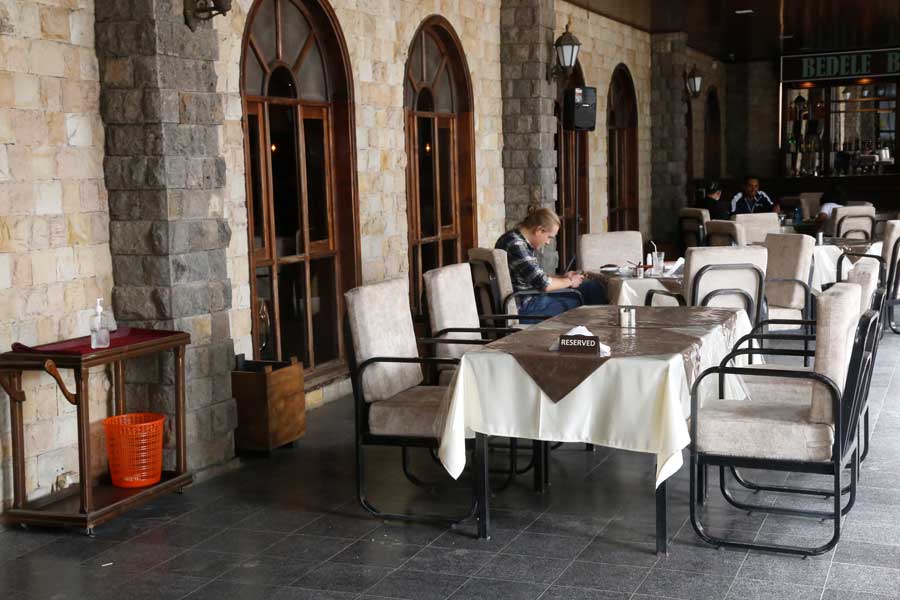
Radar | Feb 15,2020
Apr 1 , 2023
By Owen Gaffney
The Intergovernmental Panel on Climate Change (IPCC) has issued a final warning to humanity. Unless we halve greenhouse gas (GHG) emissions by 2030, we will have no chance of capping global temperatures at 1.5° Celsius above pre-industrial levels. Achieving that target will be extremely challenging, but it is both possible and affordable – if we ensure that the world's wealthiest pay their fair share.
Inequality has skyrocketed in recent years. During the pandemic, as more than 160 million people were pushed into poverty, the world's 10 richest people doubled their fortunes. The wealthiest 10pc of the global population now rake in 52pc of global income and hold 77pc of global wealth, while the poorest 50pc claim just eight percent and two percent, respectively.
The gap continues to widen. Billions of people suffer from rising living costs and stagnant wages, and with a recession looming, prospects for achieving greater prosperity appear bleak. The world has never been so wealthy, yet most people endure chronic economic insecurity. This is a recipe for deeply polarized, dysfunctional societies, democratic decay, and a dangerously unstable world.
Economic inequality is reflected in climate inequality.
The IPCC notes that the 10pc of households with the highest per capita emissions – the wealthiest households globally – contribute up to 45pc of consumption-based household GHG emissions. The bottom 50pc – four billion people, many of whom face severe energy insecurity – contribute just 13-15pc.
Here, too, the gap is continuing to widen: the richest one percent – 63 million people earning at least 109,000 dollars per year – are the fastest-growing source of carbon emissions by far. And this is happening at a time when, every month, the world is burning through more than one percent of its remaining carbon budget to limit global warming to 1.5°C.
But the discrepancy in emissions is only part of the story.
As the IPCC's new report highlights, there is overwhelming scientific evidence showing that an equitable approach to climate action, in which the benefits and burdens of the needed transformation are distributed fairly, is vital to building social trust, without which the 2030 target will be all but impossible to meet.
This aligns with our assessment at Earth4All. Unless concerted action is taken, we predict that inequality will continue to grow throughout this century, leading to rising social tensions and unrest – and making it far more difficult to tackle existential crises like climate change.
The concentration of wealth leads to the concentration of power, with the wealthiest actors enjoying disproportionate influence over elections and public policy. This undermines trust in democracy, making it more difficult for governments to make long-term decisions that serve the common good. More egalitarian countries tend to have higher levels of trust in government and better outcomes when it comes to education, health and longevity, obesity, child mortality, crime, and the environment.
As the IPCC report makes clear, averting the worst effects of climate change demands a profound economic transformation in the next decade. But that transformation can succeed only with broad public support, based on a new social contract ensuring a fairer wealth and income distribution.
Specifically, by 2030, Earth4All proposes that the wealthiest 10pc in all countries should be claiming less than 40pc of national incomes, with their share remaining on a downward trajectory thereafter. Past experience shows that progressive taxation on both income and wealth for individuals and corporations would effectively achieve this.
This means targeting the assets of the extremely wealthy wherever they are held, including in tax havens, and developing and sharing national registries of assets held in different forms. Governments should also hike taxes on luxury-related consumption that drives GHG emissions, such as using private jets.
In addition, we recommend implementing a universal minimum corporate-tax rate that is close to the global average of 25pc – far higher than the 15pc rate agreed by the G20 in 2021. Multinational corporations should be subject to the same tax rates as domestic companies, with unitary taxation of global profits based on each country's share of sales, employment, and assets.
We also propose taxing windfall profits in sectors like energy. While the world has confronted an energy crisis driven by the war in Ukraine, fossil-fuel companies should not have been able to pocket hundreds of billions of dollars in profits. Likewise, governments must close international tax loopholes and eliminate outsize subsidies on gossip fuels – now topping one trillion dollars annually – once and for all.
The IPCC estimates that removing subsidies could lower GHG emissions by up to 10pc by 2030.
More broadly, governments should use progressive taxation to discourage share-buyback schemes. At a time when the world needs innovation to facilitate economic transformation, inflating shareholders' gains must not come before investment in research and development.
Crucially, whatever progressive wealth and income taxes generate additional revenues must be used to protect the most vulnerable groups, support those who are displaced by the green transformation, advance gender equality, and overhaul energy and food systems.
By easing social tensions and improving well-being, progress on inequality would make democracies more stable and resilient, enabling them to respond to shocks more effectively and make rational long-term decisions for the common good, not least with regard to climate change.
But, as the IPCC has made clear, time is running out.
PUBLISHED ON
Apr 01,2023 [ VOL
23 , NO
1196]


Radar | Feb 15,2020

Agenda | Sep 27,2020

Commentaries | Mar 01,2024

Radar | Jun 24,2023

Featured | Aug 16,2020

Fortune News | Mar 26,2022

Radar | Jan 11,2020

In-Picture | Nov 24,2024

Fortune News | May 27,2023

Radar | May 25,2019

My Opinion | 131970 Views | Aug 14,2021

My Opinion | 128359 Views | Aug 21,2021

My Opinion | 126297 Views | Sep 10,2021

My Opinion | 123913 Views | Aug 07,2021

Dec 22 , 2024 . By TIZITA SHEWAFERAW
Charged with transforming colossal state-owned enterprises into modern and competitiv...

Aug 18 , 2024 . By AKSAH ITALO
Although predictable Yonas Zerihun's job in the ride-hailing service is not immune to...

Jul 28 , 2024 . By TIZITA SHEWAFERAW
Unhabitual, perhaps too many, Samuel Gebreyohannes, 38, used to occasionally enjoy a couple of beers at breakfast. However, he recently swit...

Jul 13 , 2024 . By AKSAH ITALO
Investors who rely on tractors, trucks, and field vehicles for commuting, transporting commodities, and f...

Jul 5 , 2025
Six years ago, Ethiopia was the darling of international liberal commentators. A year...

Jun 28 , 2025
Meseret Damtie, the assertive auditor general, has never been shy about naming names...

Jun 21 , 2025
A well-worn adage says, “Budget is not destiny, but it is direction.” Examining t...

Jun 14 , 2025
Yet again, the Horn of Africa is bracing for trouble. A region already frayed by wars...

Jul 6 , 2025 . By BEZAWIT HULUAGER
The federal legislature gave Prime Minister Abiy Ahmed (PhD) what he wanted: a 1.9 tr...

Jul 6 , 2025 . By YITBAREK GETACHEW
In a city rising skyward at breakneck speed, a reckoning has arrived. Authorities in...

Jul 6 , 2025 . By NAHOM AYELE
A landmark directive from the Ministry of Finance signals a paradigm shift in the cou...

Jul 6 , 2025 . By NAHOM AYELE
Awash Bank has announced plans to establish a dedicated investment banking subsidiary...